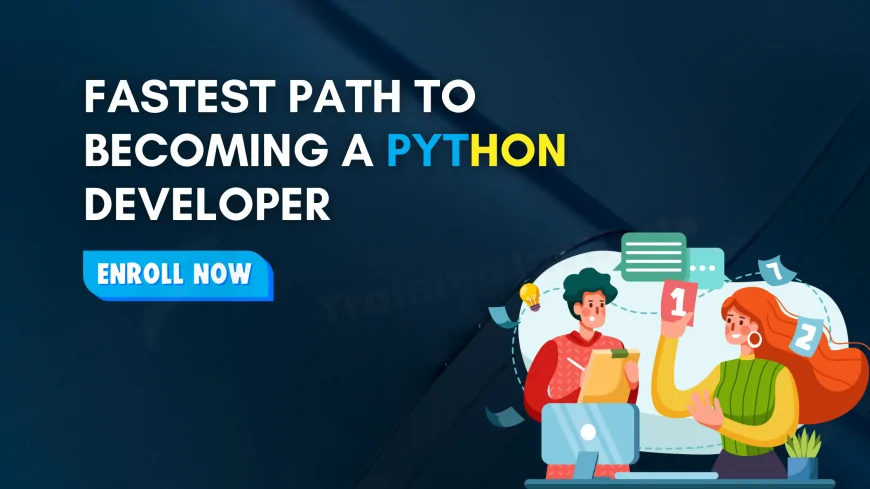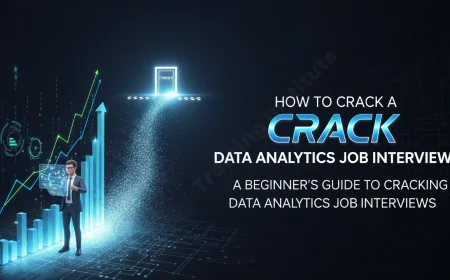Fastest Way to Become a Python Developer in 2025 | Step-by-Step Guide
Discover the fastest way to become a Python developer in 2025 with this detailed, step-by-step guide. Learn Python quickly, build real projects, master tools, and start your developer career faster than ever.

Python has evolved from a general-purpose programming language into a cornerstone of modern software development. From web apps and data analysis to machine learning and automation, Python’s simplicity and versatility make it the top choice for aspiring developers. But in a world that moves fast, how do you become a Python developer quickly without sacrificing depth or understanding?
In this blog, we'll cover a streamlined, no-fluff path to becoming a professional Python developer in the fastest time possible, backed by real-world strategies, tools, and learning techniques tailored for 2025 and beyond.
1. Understand Why You Want to Learn Python
Before diving in, define your goal:
-
Web development?
-
Data science?
-
Automation?
-
Game development?
-
AI/Machine Learning?
Clarity on your destination will determine your roadmap. For example, a Python web developer might focus on Flask, Django, HTML/CSS, and REST APIs, while a data science aspirant would dig into pandas, NumPy, and Jupyter Notebooks.
2. Master the Fundamentals (Week 1–2)
Start with the core basics:
-
Variables, data types, and operators
-
Conditional statements and loops
-
Functions and recursion
-
Lists, tuples, dictionaries, and sets
-
File handling
-
Error handling
Resources:
-
Official Python Docs
-
YouTube crash courses
-
FreeCodeCamp Python tutorials
Tools:
-
Code editor: VSCode or PyCharm
-
Python 3.x installed locally or via Anaconda
Practice on:
-
HackerRank (Python Basics)
-
LeetCode (Easy problems)
3. Get Hands-On with Mini Projects (Week 3–4)
Building real projects is the fastest way to internalize concepts.
Examples:
-
To-do app (CLI or GUI)
-
Expense tracker
-
Weather app using an API
-
Basic web scraper
-
Email automation script
Skills Developed:
-
Debugging
-
Input/Output
-
Working with external libraries
4. Learn Object-Oriented Programming (Week 4–5)
Object-Oriented Programming (OOP) is essential for writing scalable and maintainable code.
Key concepts:
-
Classes and objects
-
Encapsulation
-
Inheritance
-
Polymorphism
Project Ideas:
-
Library management system
-
Banking app
Use diagrams to visualize class relationships using tools like draw.io.
5. Version Control with Git and GitHub (Week 5)
You can’t be a developer today without knowing Git. Learn to:
-
Initialize a repository
-
Stage and commit changes
-
Create branches
-
Merge branches and resolve conflicts
-
Push to GitHub
Tip: Contribute to open-source Python projects on GitHub to practice real-world workflows.
6. Choose a Specialization and Focus Deep (Week 6–10)
Here’s where you stop being a generalist and start carving your niche. Choose one:
A. Web Development
-
Flask or Django
-
HTML5, CSS3, JavaScript (basics)
-
REST APIs
-
SQL and SQLite/PostgreSQL
Mini Projects:
-
Blog site
-
RESTful API with user auth
-
Task management web app
B. Data Science & Machine Learning
-
Libraries: pandas, NumPy, matplotlib, seaborn
-
Jupyter Notebooks
-
Scikit-learn, TensorFlow (basic models)
-
Data cleaning, EDA, visualization
Mini Projects:
-
Predictive analytics (e.g., house prices)
-
Sentiment analysis
-
Data dashboards
C. Automation/Scripting
-
Automate Excel reports with openpyxl
-
Browser automation with Selenium
-
Scheduling scripts with cron or Task Scheduler
Mini Projects:
-
Auto email sender
-
Bulk file renamer
-
Web form filler
7. Understand Testing and Debugging (Week 11)
Professional code must be robust and error-free.
Learn:
-
Writing unit tests with
unittestorpytest -
Using breakpoints and Python debugger (
pdb) -
Writing test cases for your functions
8. Deployment and Production Readiness (Week 12)
It’s not enough to build — you must deploy.
Understand:
-
How to deploy apps using platforms like Heroku, PythonAnywhere, or AWS
-
Creating and managing virtual environments
-
Packaging your code with
piporsetuptools
9. Build a Portfolio That Stands Out
A strong GitHub profile is your best resume.
Must-haves:
-
3–5 well-documented projects
-
Clear README files
-
Project demos or hosted links
Bonus: Write blogs on your learning journey or projects on platforms like Medium or Dev.to
10. Learn the Developer Ecosystem
Tools and practices you’ll encounter:
-
IDEs (VSCode, PyCharm)
-
Terminal commands
-
Virtual environments (venv, conda)
-
Linters like flake8, black
-
Continuous Integration tools like GitHub Actions
11. Practice, Practice, Practice
Consistency beats intensity.
-
Code daily (even for 30 minutes)
-
Join coding communities and forums
-
Attend online hackathons and challenges
-
Follow coding YouTube channels and blogs
12. Apply for Freelance or Internships (Week 13–16)
You don’t need a degree to get work.
-
Start on Fiverr, Upwork, Freelancer
-
Look for remote Python internships
-
Network on LinkedIn and GitHub
-
Email startups and offer to build MVPs
Tip: Show your value by showcasing past projects and problem-solving abilities.
13. Keep Learning: Advanced Topics (Ongoing)
Once you’ve mastered the basics, level up with:
-
Asynchronous programming (asyncio)
-
APIs with FastAPI
-
Advanced database interactions with SQLAlchemy
-
Docker for Python apps
-
Unit testing and CI/CD
14. Soft Skills and Real-World Readiness
Technical skills alone won’t cut it.
-
Improve communication and collaboration
-
Write clean, readable code
-
Document your code properly
-
Learn to give and receive code reviews
FAQ's
1. How long does it take to become a Python developer?
Most learners can become job-ready in 3–6 months with consistent practice and a focused learning path that includes projects, internships, and advanced tools.
2. Can I learn Python without any programming background?
Yes, Python is beginner-friendly. With structured training and practical projects, even complete beginners can pick it up quickly and become proficient.
3. What are the career options after learning Python?
Python developers can work in web development, data science, automation, machine learning, game development, and cybersecurity—making it one of the most versatile skills in tech.
4. Do I need a degree to get a job in Python development?
No. Many employers prioritize skills over degrees. A strong portfolio and practical knowledge often matter more than formal education.
5. What should I learn first in Python?
Start with fundamentals like variables, data types, control flow, functions, loops, and error handling. Mastering these sets a strong foundation for all paths.
6. Are projects important for becoming a Python developer?
Absolutely. Projects prove your skills and help build a real-world portfolio, which is crucial for getting hired or freelancing.
7. Is Python enough to get a job, or should I learn more?
Python is powerful, but depending on your career path, you may also need to learn frameworks (like Django), databases, or front-end skills (like HTML/CSS).
8. How can I practice Python coding daily?
Use platforms like LeetCode, HackerRank, or CodeWars. Working on small automation scripts or personal projects also boosts daily practice.
9. What tools should a Python developer know?
Essential tools include Git, GitHub, virtual environments (venv/conda), IDEs like VSCode or PyCharm, and testing libraries like pytest.
10. Is Python development good for freelancing?
Yes. Python’s flexibility makes it ideal for freelance gigs in automation, web scraping, small web apps, and data processing.
11. Which Python libraries should I learn for web development?
Start with Flask or Django. You’ll also need libraries like requests for APIs, and tools like SQLAlchemy for databases.
12. How can I build a standout portfolio as a Python developer?
Include 3–5 unique, practical projects with GitHub links, live demos, and clear documentation. Blogs explaining your process add value.
13. Can I get a remote job as a Python developer?
Yes. Many companies hire remote developers. A solid online presence, GitHub profile, and job-ready portfolio help you stand out.
14. What’s the fastest way to start earning from Python skills?
Freelancing, internships, and micro-jobs are quick ways to monetize your skills. Sites like Upwork or Fiverr can help you get started.
15. Do companies in Pune hire Python developers?
Yes. Pune has a thriving IT ecosystem with strong demand for Python developers across startups and enterprises.
16. What is the average salary of a Python developer in Pune?
Python developers in Pune can earn from INR 3–12 LPA, depending on experience, skill level, and project exposure.
17. What’s the difference between scripting and full-stack development in Python?
Scripting involves automating tasks, while full-stack development means building end-to-end applications with front-end and back-end technologies.
18. Should I learn data structures with Python?
Yes. Understanding data structures (lists, stacks, queues, etc.) is essential for efficient coding and technical interviews.
19. What are some good projects for beginners in Python?
Try building a calculator, to-do list app, weather checker, URL shortener, or budget tracker to solidify your skills.
20. How can I stay updated in the Python ecosystem?
Follow Python newsletters, subscribe to YouTube channels, join coding communities, and keep experimenting with new tools and libraries.
Your Fast Track to Python Development
Becoming a Python developer doesn’t require years of study — just a focused, consistent approach and the right mindset. Whether you want to build apps, automate tasks, or analyze data, Python opens doors across industries.
By following this roadmap, you'll be equipped to not just learn Python fast, but to thrive as a confident, employable developer in 2025 and beyond. Stay curious, build relentlessly, and always level up!
What's Your Reaction?
 Like
0
Like
0
 Dislike
0
Dislike
0
 Love
0
Love
0
 Funny
0
Funny
0
 Angry
0
Angry
0
 Sad
0
Sad
0
 Wow
0
Wow
0














